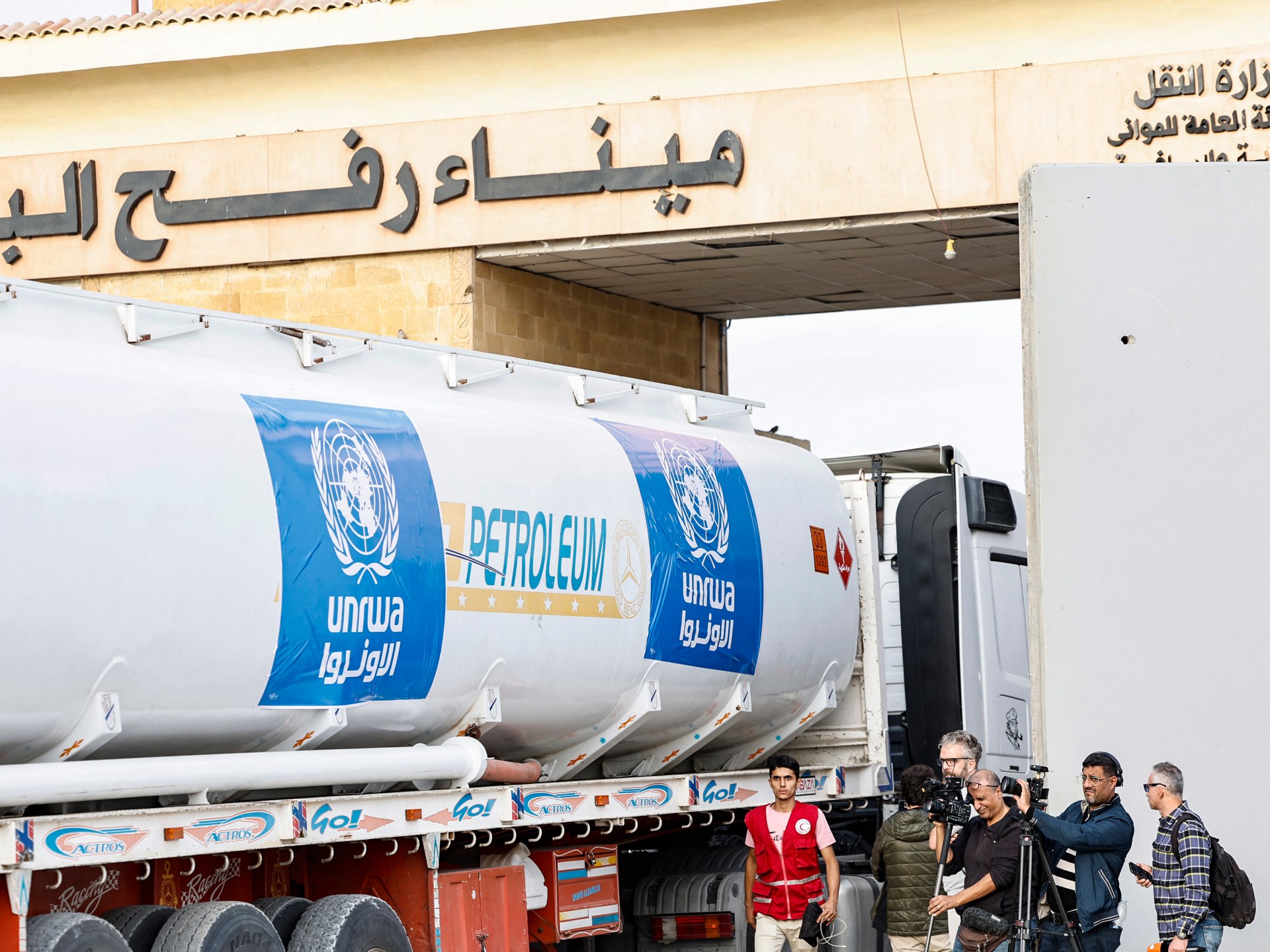Italy, Australia, US, Canada halt support after Israel accused UNRWA staff of involvement in Hamas’s October 7 attacks.
Top Palestinian officials and Hamas have criticised the decision by some Western countries to suspend funding to the United Nations relief agency for Palestinians and called for an immediate reversal of the move that entails “great” risk.
The UN Relief and Works Agency for Palestine Refugees in the Near East (UNRWA) earlier said it had opened an investigation into some employees that Israel alleges were involved in the October 7 attacks that triggered the current conflict.
On Saturday, Palestine Liberation Organization (PLO) Secretary-General Hussein al-Sheikh said the countries’ decision “entails great political and humanitarian relief risks”.
“At this particular time and in light of the continuing aggression against the Palestinian people, we need the maximum support for this international organization and not stopping support and assistance to it,” he wrote on X, urging the countries to “immediately reverse their decision”.
We call on the countries that announced the cessation of their support for #UNRWA to immediately reverse their decision, which entails great political and humanitarian relief risks, as at this particular time and in light of the continuing aggression against the Palestinian… https://t.co/mxIam0zmZs
— حسين الشيخ Hussein AlSheikh (@HusseinSheikhpl) January 27, 2024
Italy, Australia, Canada and the United States said they would halt funding to the agency, while European Union foreign policy chief Josep Borrell said the 27-member bloc would “assess further steps and draw lessons based on the result of the full and comprehensive investigation”.
Hamas on Saturday slammed Israeli “threats” against the agency, after Israel accused several UNRWA staff of involvement in Hamas’s October 7 attacks in southern Israel that the authorities there say killed about 1,140 people.
“We ask the UN and the international organisations to not cave in to the threats and blackmail” from Israel, Hamas’s press office said in a post on Telegram.
On Friday, UNRWA said it had fired several employees and that it had opened an investigation into the allegations.
“The Israeli authorities have provided UNRWA with information about the alleged involvement of several UNRWA employees in the horrific attacks on Israel on October 7,” said UNRWA Commissioner-General Philippe Lazzarini.
“To protect the agency’s ability to deliver humanitarian assistance, I have taken the decision to immediately terminate the contracts of these staff members and launch an investigation in order to establish the truth without delay.”
Aid freeze
Italy’s Foreign Minister Antonio Tajani said on Saturday that his country was joining its allies and cutting its support for the agency.
“Allied countries have taken a similar decision. We are committed to providing humanitarian aid to the Palestinian population while protecting Israel’s security,” he posted on X.
Australia’s Foreign Minister Penny Wong said she was “deeply concerned” by the allegations against UNRWA.
“We are speaking with partners and will temporarily pause disbursement of recent funding,” she wrote on X.
“We welcome UNRWA’s immediate response, including terminating contracts and launching an investigation, as well as its recent announcement of a full investigation into allegations against the organization,” she added.
Israel praised the countries for halting their support to the UN agency, saying it wants to completely stop its operations after the war on Gaza has ended.
Commending the US government for its decision to cease funding to @UNRWA after it was revealed that some of its employees were involved in the heinous massacre on #October7.
We have been warning for years: @UNRWA perpetuates the refugee issue, obstructs peace, and serves as a…
— ישראל כ”ץ Israel Katz (@Israel_katz) January 27, 2024
Foreign Minister Israel Katz said Israel “aims to promoting a policy ensuring that UNRWA will not be a part of the day after, addressing other contributing factors”.
“We will work to garner bipartisan support in the US, the European Union, and other nations globally for this policy aimed at halting UNRWA’s activities in Gaza,” he said.
Independent investigation
Canada’s International Development Minister Ahmed Hussen on Friday announced that Ottawa had “temporarily paused any additional funding to UNRWA while it undertakes a thorough investigation into these allegations”.
“Canada is taking these reports extremely seriously and is engaging closely with UNRWA and other donors on this issue,” he wrote on X.
“Should the allegations prove to be accurate, Canada expects UNRWA to immediately act against those determined to have been involved in Hamas’s terrorist attacks.”
The US halted funding to UNRWA on Friday because of the allegations against 12 employees who “may have been involved” in the Hamas attack.
Lazzarini did not disclose the number of employees nor the nature of their alleged involvement, but said “any UNRWA employee who was involved in acts of terror” would be held accountable, including through criminal prosecution.
UN chief Antonio Guterres has pledged to conduct an “urgent and comprehensive independent review of UNRWA”.
At least 26,257 people have been killed and 64,797 wounded in Israeli attacks on Gaza since October 7.
Check out our Latest News and Follow us at Facebook
Original Source

